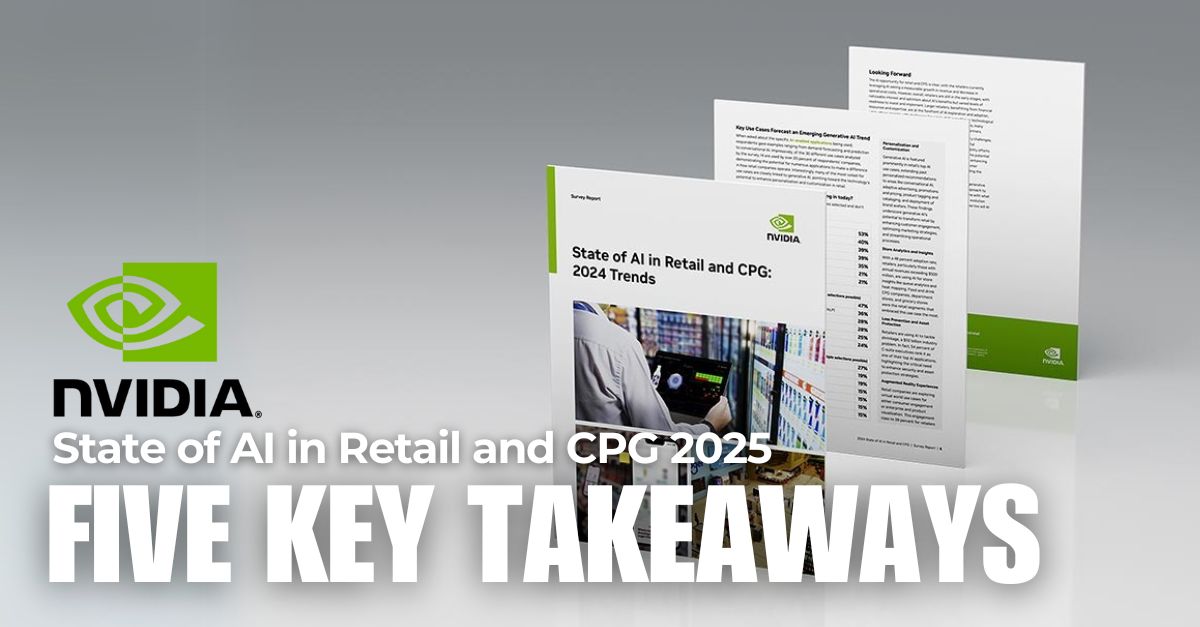AI & Robotics
5 Takeaways from NVIDIA the State of AI in Retail and CPG 2025

AI is transforming the retail industry and CPG sectors, delivering measurable improvements in efficiency, customer engagement, and profitability. Drawing from the State of AI in Retail and CPG: 2025 Trends survey by NVIDIA, this blog highlights FIVE key insights for retail leaders. These trends underscore AI’s growing role in addressing operational challenges and driving business success.
1. AI Adoption Is Nearly Universal Across Retail Operations
The retail industry has applied AI at an unprecedented scale, with 89% of surveyed companies either actively using or evaluating AI, up from 82% in 2023. Retailers are applying AI across different functions, including digital channels, supply chain management, in-store operations, and back-office tasks. Notably, 51% of respondents reported using AI for 6 or more use cases, such as inventory optimisation, demand forecasting, and personalised marketing. The impact is positive; about 87% of AI users saw increased annual revenue, and 94% reported reduced operational costs.
For retail in Hong Kong, this adoption signals that AI is now a critical component of business strategy. To remain competitive, companies must integrate AI into core operations, leveraging its ability to enhance decision-making and streamline processes.
2. Generative AI Improves Retail Marketing and Customer Experiences
Generative AI, which generates content using neural networks, is becoming a popular tool among retailers, with 82% of companies either using or testing it. The most common application is marketing content creation, adopted by 60% of retailers to develop marketing pieces like text, images, and videos. Other common use cases include predictive analytics (44%), personalised marketing (42%), and digital shopping assistants (40%), all of which enhance customer engagement and loyalty.
However, data privacy (60%) and data security (49%) remain top concerns, emphasising the need for data privacy governance. Hong Kong retailers should collaborate with trusted technology partners e.g. HKT to deploy generative AI solutions that prioritise compliance.
3. AI Optimises Supply Chain Performance
Supply chain complexities have grown, with 59% of executives noting increased challenges over the past year. AI is proving vital in addressing these issues, with 82% of supply chain professionals planning to reinforce AI investments in 2025. The key focus is demand forecasting (82%), followed by logistics optimisation and robotics, such as pick-and-place systems (29%). AI has driven good results, such as cost reductions of 10% or more for 25% of companies and improved business decisions through data analysis (58%).
Hong Kong Retailers can leverage AI to review supply chain efficiency, meet rising customer expectations for rapid delivery, and support the expansion of e-commerce. Technologies like digital twins for warehouse optimisation offer further opportunities to improve performance.
4. AI Investments Deliver Big Returns
AI is proving its value with substantial returns on investment. The highest ROI comes from marketing and advertising content creation (23%), followed by customer analysis and segmentation (19%) and hyperpersonalised recommendations (18%). Additionally, 43% of respondents reflected improved insights and decision-making, while 42% noted enhanced employee productivity, a sharp rise from 14% in 2023. An independent study reported a 374% ROI over three years for retailers using Evercheck (an AI-powered loss prevention solution), demonstrating AI’s economic value.
These findings point out that AI is a powerful catalsyer of revenue and efficiency. Retailers in Hong Kong should focus more on high impact AI use cases, such as O2O customer analytics and marketing content creation, to maximise returns while scaling AI initiatives.
5. Addressing Evolving Challenges: Governance and Explainability
As AI applications mature, new challenges emerge. The top concern in 2024 was the need for explainable AI tools (33%), reflecting a demand for solutions that provide clarity on how AI functions. Recruiting AI talent (31%) and measuring ROI (28%) also remain significant hurdles, though concerns about inadequate technology dropped from 42% in 2023 to 28% in 2024. Governance of AI is another priority, with 52% of retailers viewing it as critical, yet only 46% have formal AI governance policies in place.
To overcome these challenges, retailers should invest in transparent AI solutions, establish robust governance mechanisms, and partner with technology providers e.g. HKT to access security expertise. This approach will support sustainable AI adoption and build stakeholder trust.
Get Ready for an AI-Driven Retail Transformation
This report highlights AI’s transformative impact on retail, from enhancing customer experience to optimising operations. With 97% of retailers planning to increase budget on AI deployment in the coming year, the industry is moving toward deeper integration of AI solutions. Emerging AI technologies, such as AI agents, are set to further redefine retail by enabling smarter.
To succeed in this AI-driven landscape, retailers need a reliable technology infrastructure. HKT Ultra 50G Business Broadband delivers the high-speed connectivity required for real-time AI applications, ensuring seamless operations. HKT Cloud Computing Solutions provide scalable platforms for processing large datasets and deploying AI models efficiently. Additionally, HKT Managed Data Center Services offer secure, high-capacity environments to safeguard sensitive data, addressing privacy and security concerns.